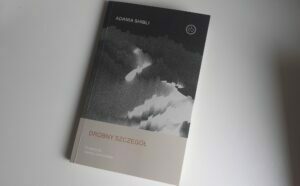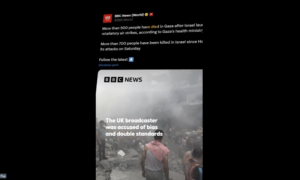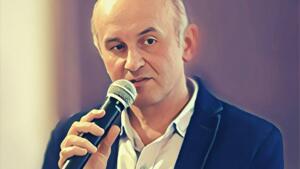We talk to the writer Żanna Słoniowska about the year of Ukrainian literature on the Polish and foreign publishing market, Polish-Ukrainian relations and the decolonization of Russian literature
You come from Lviv, speak Polish, Ukrainian and Russian, and have lived in Poland for 20 years. Suddenly, in a short time, about 1.5 million people from Ukraine moved to Poland. From your perspective, what did this joint year of Poles and Ukrainians look like?
Poles surprised even themselves with their openness and hospitality, didn’t they? Many great things have happened. It’s like having a big reunion after years of absence with a long-lost friend. Poles and Ukrainians have lived side by side for years, sometimes in one country, but now we are seeing a new version of this old story. I have to share an image that gives me goosebumps. It is said that Polish children now have Ukrainian dreams. Psychotherapists state that when many specialists start at once with a similar topic from their clients, a social change might be underway. The point is that children in a country that is not at war dream about it, separation from their parents, and exile.
From the beginning of the war, many Poles also started learning Ukrainian.
After all, it is the easiest foreign language for them! Polish and Ukrainian share as much as 70% of their vocabulary. You have to switch to Cyrillic, then it’s all downhill. In Central and Eastern Europe, we are eager to learn Western languages, but only some people devote time to their neighbors’ tongues, i.e., Czech, Slovak and Belarusian. And yet, if you think about it, a Pole and a Ukrainian or a Pole and a Czech using English between themselves is a bit absurd.
Many writers came to Poland after 24 February last year. What kind of artists work in our country in exile?
Many Polish institutions supporting artists immediately opened their doors to Ukrainian creatives fleeing the war. It is mainly about women, with and without children. In Krakow, these were for example, Krakow UNESCO City of Literature and Villa Decius. On the first day after the outbreak, the Institute of Literature announced annual artistic residencies for Ukrainian men and women.
Among others, the excellent poet Ołesia Mamczycz lives in Krakow, whose translations of Miłosz’s poems sound more melodious than his original works. The well-known Ukrainian writer Oksana Zabużko, who was in Warsaw when the war started, spent a year in Poland as part of a residency for artists. There is also Natalia Belczenko – she first settled in late Wisława Szymborska’s apartment, and it inspired her to write one of the most powerful poems from the beginning of this invasion.
Some Ukrainian artists, however, decided to stay in their country. How do they describe the events of the war? Do they write about them? Generally speaking – what is the life of Ukrainian literary culture like in Ukraine itself?
Of course, in war, survival comes as a priority.
I often hear questions about whether Ukrainian writers can even create in those trying times. The writer Wiktoria Amelina, a guest at the Zygmunt Haupt Festival in Gorlice in the autumn, was also asked about it. She was returning from the newly liberated Izium, so she replied: now we are merely documenting, writing will come later.
She said that with other writers, they travel around the former occupied territories, record the crimes, write down what they see, keep diaries.
My Ukrainian publisher, Old Lion Publishing, decided in the first weeks of the war that it was worth looking at literature less commercially, and opened free access to some of their books on the Internet.
On the other hand, my close friends, a writer and a painter, unanimously claim that in terms of creativity it was one of the most prolific years for them. I don’t know how they manage to create among bomb alarms, but, an interesting phenomenon, none of my childless friends go down to shelters during alarms…
Shortly after the outbreak of the war, a lot of articles about Ukrainian art appeared in the Polish media, and publishing houses promoted what they had in their offer. Oksana Zabuzhko’s Planet Wormwood essays published at that time sold exceptionally well, as well as reissues of works by Serhiy Zhadan and other artists. Many works were published by niche publishing houses. Have Poles become better acquainted with Ukrainian art and culture?
Undoubtedly, the Russian invasion has increased interest in Ukrainian culture, and this is indeed wonderful, such a blessing in disguise. I don’t have access to publishing statistics, but I have the impression that more is being translated, that also completely new things are being released.
Many meetings around Ukrainian literature are also being organized. I was perhaps most touched by an invitation from the Jagiellonian University to conduct a mini-lecture titled “What is Ukrainian poetry” for students of European studies. The topic sounds very general, but while preparing for it, I realised that I have been asking myself this question for the last 20 years of living in Poland and now I can finally share my answers. At the same time, Marcin Gaczkowski, an excellent translator of Ukrainian literature, presented a book of poems Merry Cemetery by Wasyl Stus, it’s a kind of Stus for the intermediate. We argued then whether it would not have been better to start with Stus’ deeper works, but after all, observing the reactions of Polish readers, I understood that he was right about the choice, and this is the proper introduction of the polish market to the works of one of the most important Ukrainian poets, tortured in a labour camp at the dawn of perestroika.
A couple days later, I hosted a meeting on the works of Hryhori Chubai on the occasion of the publication of the translation of his literature by the College of Eastern Europe. One could argue about what could be improved in this translation, but the fact that most of the audience in Krakow had never heard of Czubai before gave me the feeling that important, groundbreaking changes were due.
Over the last year I have travelled a lot as a writer to Spain, Ireland, India, and many German cities. Fortunately, it appears that people want to know more about Ukrainian culture, history and identity.
How did these meetings go?
I had to answer questions such as what are the Ukrainian identity and literature, what historical events led to what is happening now etc.
I am not surprised that, let’s say, educated and well-read Spanish journalists knew nothing about these topics. Ukrainian cultural diplomacy had worked very poorly, and Ukrainian literature in most bookstores in the West is mixed on the shelves with its Russian counterpart, and the same is true of Polish literature as well.
If our vision is close to yours, support us! Join the unique community of our donors >>>
In the case of Germany, one could talk a lot about such themes as pacifism and anti-Americanism of the generation born immediately after World War II. About their trauma towards the killed Russians, although people of all nations living in the USSR, mostly Ukrainians and Belarusians, died at the time. Timothy Snyder mentions that the image of a Russian who is a winner and a victim at the same time is comprehensible and close to the German heart.
I have a friend, a German writer, who is a generation older than me. I respect her very much and we correspond regularly. Even before the outbreak of the war, when Putin made absurd demands to stop expanding NATO’s sphere of influence to the East, she made me understand that Ukraine had always been in the Russian sphere of influence and should remain there. It did not occur to her that Ukrainians were not just a pawn in somebody’s great game, that they had the right to their own opinion, to self-determination.
At the beginning of May I went on a scholarship to Hamburg. On the first day of my stay at the writers’ housing space, one German author started a speech about listening to both sides of the conflict. I felt like there was nothing more to talk about with her. When an aggressor attacks a defenceless person with a knife, is the assaulter’s point of view what we want to listen to?
The need for decolonization of Russian history, culture and literature seems to be extremely important in the face of what you are saying. What does the process look like now?
I am glad that now the whole world is talking about it, that academic conferences are being held, polemical articles are being published in well-known media. An example of that is a very interesting text by Elif Batuman that has recently been published in The New Yorker. On the other hand, though, I often get questions like “have you already thrown books of Russian literature off your shelves?” This one I have heard from a Polish woman in Dresden.
Of course, I’m not going to throw away any books. We just need to start re-reading familiar stories anew. I was once impressed by the sentence of a Russian opposition columnist: “We fought communism, we forgot about Russian imperialism.”
It is exactly with this in mind that we filter through the words and stories of the well-known literary works. It is partially already happening. Not for the first time either. The English, after all, already have the experience of dealing with it.
Culture without ethics
So much about the honest intellectual work, but the issue of Russian culture “entering” different countries on tanks, culture as a tool of the Russian imperial narrative, is something different altogether. Recently, at an author’s meeting in Bremen, a gentleman from the audience told me three times that Russian culture should not be “erased”, even after I have already explained to him that it was perfectly safe, and that he should now turn his attention to the Ukrainian children dying under Russian bombs or squatting without light in shelters. This gentleman might have been under the influence of another “active operation” of the Russian special services, which is being successfully implemented in the West.
Another shameful narrative is to be found in the statements of Russian intellectuals, ironically called choroszyje russkije, who now whine about the need to separate war from culture. This evil war from the “great” Russian culture. I know those words well from school, I went to the Russian one – all cultures there were just cultures, but only one, Russian was closely associated with the adjective “great”. According to them, the war is Putin, they do not identify with it, and culture exists as something separate from current events, as if in a vacuum. But if culture existed separate from ethics and justice, then it wouldn’t be worth that much.
It is precisely now, during the war, that one can also devote more time to learning and discovering Ukrainian culture. Read, understand and translate into foreign languages novels by Ivan Bahrianoho, written at the same time and on a similar subject as Solzhenitsyn’s The Gulag Archipelago, but with a much better literary quality.
Your book Owwa, published in October 2022, is a great guide for children and teenagers, but not only, about the art and history of Ukraine. It is also a fantastic step towards showing the unique character of Ukrainian culture. How did you come to that? Does the idea stem from before the Russian invasion?
The Two Sisters Publishing House approached me with an offer to write a book in the “World for the Inquisitive” series during the pandemic, and that is when the book has been written. It was ready to be published when the war broke out, but unfortunately it needed to be updated before its release. Reworking the chapter about the creeping war that began in 2014, also the fragment about the world’s largest plane An-225 Mrija, which ceased to exist, had to be modified.
Are you working on any book right now?
I am finishing my third novel, which will be published by Znak Social Publishing Institute. It is an adventure story with South Africa, Poland and Ukraine in the background.
As I mentioned, the Polish publishing market abounds in Ukrainian premieres, especially of contemporary Ukrainian literature. Do you see anything lacking? The publishing of what Ukrainian works are you especially looking forward to?
I’m waiting for books that are yet to be written. I don’t even know if anyone is already thinking in this direction. Let’s start with non-fiction. I keep repeating that this beautiful emotional upsurge that Poles and Ukrainians have experienced since February last year is not forever. Emotions tend to dissipate without a trace. Difficult historical topics need to be worked through, especially those that currently function in the form of memes, such as Volhynia and Bandera, along with those that are taboo, such as Operation Vistula. Reconciliation has to be based on two pillars: peaceful coexistence and mutual understanding in the present are one of them. The second is joint intellectual work, especially in the field of uncomfortable issues, unhealed wounds, unnamed phenomena from the past. However, the narrative is that now is not the best time for that, because winning is what matters most. But there is never enough time for honest, deeper contemplation, which usually has fatal consequences.
I am waiting for good literature that will deal with and explore the common history of Poles and Ukrainians. I am hoping to see several positions on the actions of the UPA, and that the only written scientific papers on the Vistula Operation or the camp in Jaworzno will be made available for wider audience.
That somebody would write biographies of important and fascinating figures from the Polish-Ukrainian borderland, for example about Andrzej Szeptycki, the grandson of Aleksander Fredro.
When it comes to fiction, I am always waiting to read new and engaging stories.
Are there any translations you look forward to?
I am very happy with the ongoing translation of Mickiewicz’s Dziady into Ukrainian. Partly because Ukrainian children who learn in Polish schools are not immediately able to read the original texts. It is being prepared by the excellent poet Marianna Kijanowska.
The Institute of Literature has also launched an online literary magazine in Ukrainian Posestry which means “Sisters in Struggle” – two sisters to be exact, Poland and Ukraine. They publish many translations of important Polish works into Ukrainian, even if oftentimes only in fragments.
As for the translations from Ukrainian, Dictionary of War by Ostap Śliwiński is expected to be an interesting position. Besides Polish, it is also to be published simultaneously in fifteen other languages. I’m not sure as of now if this is too far-reaching a comparison, but the idea reminds me of Victor Klemperer’s diaries, where the focus is on the language. After all, war always affects how people write and speak. Above all, the philologists should keep an eye on it.
Żanna Słoniowska – Polish writer of Ukrainian descent living in Krakow, nominated for the Nike Literary Award 2016 for her book Dom z witrażem, for which she has received the Joseph Conrad Literary Award.
Translated by Alicja Czarnocka.



